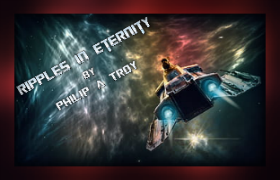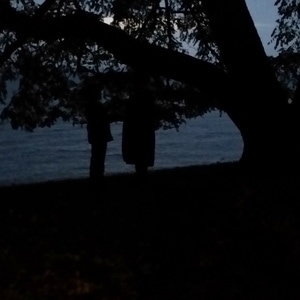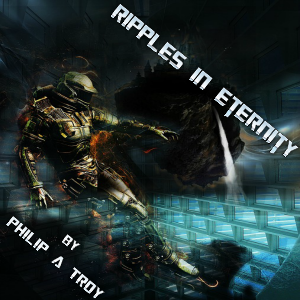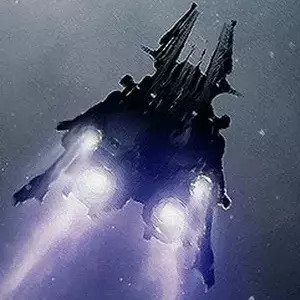“Ugh! This planet stinks,” Skinner remarked as he stepped out of the Dangerous. The humid, cloying air hit him like a punch in the face, carrying with it the smell of standing water, rotting wood and something else – some kind of foul effluvium born from the swamps itself. He gagged, covering his mouth with his hand as he took in his surroundings.
The Dangerous had docked at the end of one of several landing lanes connecting to what should have been the main port. Compared to some of the Frontier planets, this one had a very small landing zone. Four of the five docks were open for ships to dock at, and even a small ship like the Dangerous was pushing it as far as the size limit. The fifth lane was completely out of commission; the metal structural supports had given out and dropped the whole thing into the swampy water below.
Skinner peered over the edge of the railing. The muddy, greenish-brown water swirled and moved nonstop around the legs of his docking lane. Some of that was due to the eel-like creatures slithering just beneath the surface. Some of it was due to the constant opening and closing of various carnivorous plants as they dined on the swarms of insects. It was a good six feet straight down into the gooey-looking water and Skinner could still hear the insects.
He strode down the length of the docking lane and onto the actual platform. It was almost completely deserted; something he was used to seeing on Frontier worlds. Most of these colonies had been set up, at least initially, by larger corporations like Merion Arms, Haneon or Kekami. Those companies had put up the money, ships and supplies to get these colonists to their destinations. After that, the colonists would work to gather resources and other consumables for their parent companies.
Unfortunately, if the planet turned out to be barren or not worth a company’s effort, there was a high chance the contract would be annulled and the colonists left to fend for themselves while their corporate masters sought to ply a new source of revenue. At least half of the Frontier worlds he’d seen had started this way. From a business standpoint, it was far cheaper to simply pull the plug on an operation and move to the next one. After all, the Frontier Belt which divided Senate, Constellation and Gray Syndicate Space was a lawless place – a border between three giants and policed by none.
Skinner checked his pistol. When he’d first come into space, he hadn’t been that different from many other Frontier colonists. He’d wanted to leave behind a crappy situation on Earth and had only ended up in a crappier one in space. He’d been robbed, beaten, shot and almost killed several times over in the last decade and a half. Even though he’d never been here, he’d be damned if this swamp planet was going to be the end of him.
He tapped the back of his left glove against an RFID reader to open the barrier to the main docks. The machine tried to chime pleasantly, but part of the speaker was caked with moss and vegetation. Instead of a pleasant ding, it sounded more like a particularly noxious belch, followed by a semi-garbled “Welcome, Carter Bancroft.”
His name wasn’t Carter Bancroft. It wasn’t even Maxwell Skinner, but that’s what he’d gone by for the last few years. Carter Bancroft was the name of an information dealer who had been killed in a deal gone wrong. Skinner had taken his ID chip after that – it helped him get in and out of ports since he didn’t have one of his own. Only legal colonists got the chips.
A half-dead neon sign proclaimed this colony to be “Felicity” – or “Feci” based on the remaining letters. Faded imprints marked the letters that had fallen to the ground ages ago. Beyond the docks, Felicity wasn’t too different from many of the other Frontier Colonies. A power station rested in the center of town, feeding energy to the buildings around it. Three concentric rings marked the industrial, commercial and residential zones. The spaceport, or what could pass for it, rested at the southernmost edge.
The buildings, as well as a wall surrounding the colony, were all prefabricated models. They were flown in and dropped by colony ships during the early days of construction. After that, it was just a matter of connecting the wirework and routing power to each building. Felicity looked to be an older colony, with many of its once-white buildings having been covered by moss, ivy or other plant matter. They had been discolored and yellowed by age, and the metal walkways connecting them to one another had rusted and broken in several places.
Despite the crumbling, derelict appearance of the colony, Skinner was surprised to find that it was fairly well populated. Not only were there plenty of colonists living in the residential buildings and towers, but even more were wandering the crumbling pathways or attempting to contain the vegetation.
One of them, turned towards him as he descended the creaking metal stairs into the colony – a Heil. She was slightly taller than he was and dressed in standard polyform armor like his. Her skin was a mottled patchwork of white and black patches which acted like a fingerprint. No two Heil had the same designs. Her eyes were luminous and bright – even if she’d been wearing a tinted visor, they would have glowed through it. A series of bony ridges followed the curve of her cheekbones from the corner of her eyes down to her lips. Upon seeing him, she gave a thin smile that carried vaguely predatory notes – particularly because it revealed a row of sharp, shark-like teeth. She folded down a headset, pulling out a retractable microphone and putting it in front of her lips before speaking. “Welcome to Felicity, traveler,” she said.
Well, that’s what Skinner heard, anyway. His own earpiece translated her speech into a passable version of English. He could still hear her speaking her native tongue with his left ear. Skinner fumbled for his translator, pulling the microphone out of its housing and stretching it down to his lips. “Hey, how’s it going?”
She laughed at his casual speech, waving a hand. “I am well. What brings you here? It is rare for us to have visitors.”
“Resupply,” Skinner said with a vague gesture back towards the docks. “I blew a salvage run.”
The Heil gave him a pitying look. “Such a shame – had you any salvage to sell, Felicity could have used it. What do you need?”
“Mostly fuel,” he said. “Impulse drive is running a bit low. Coolant, too, if you have any.”
She scowled for a moment. “Coolant no,” she said. “We barely have enough for our reactor, let alone for a spaceship. Fuel we can do, though. I’ll send someone to the docks for you. Anything else?”
“Bug spray?” Skinner asked, swatting at a few of them. “Or a general store of some kind? I’ve got some things to look at.”
She turned and pointed him down the walkway, past a crumbling statue of a Heil pointing a sword skyward. “If you head that way, you should see Hiivas running his shop. Please put up with him – he’s old.”
“Will do,” Skinner said. “Thank you.”
She waved him off and then returned to trimming the ivy crawling down the side of a building. “And don’t slip off the path,” she called before he was out of earshot.
Hiivas’ shop, as it turned out, was one of the residential buildings with an open-air front on the lower floor. The siding had been cut away and replaced with a rolling door which allowed easy access to the interior. A counter had been installed and an ancient, half-blind Heil leaned on it with a dagger in his hand. Skinner slowly approached, knocking on the wall as he entered. “Hey, are you Hiivas?” he asked.
The Heil turned and looked him over for a fraction of a second. “Who’s askin’?” he growled in accented English, which caught Skinner off guard. Very few Heil learned other languages, seeing it as a waste of time when they could be learning new forms of combat.
“A traveler,” Skinner lied. “I’m running low on supplies and was wondering if you could help.”
The Heil laughed. “That I can!” he said, gesturing to the walls. They were lined with neat, precise rows of shelves displaying all manner of wares. “What’re ya lookin’ for? Weapons? Ammo?”
“Supplies, mostly,” Skinner answered as he stepped in. “A repair kit for a Type-I Vidar-class courier or something that’ll work on one, if you have something. Human model.”
Hiivas stabbed the knife into his counter and cocked an eyebrow. “Type-I Vidar-class? The ones that fell apart like dry bones?”
With a heavy sigh, Skinner nodded. “Yep. That one. Anything in stock?”
“Got some generic repair kits,” Hiivas said as he walked over to one of the walls. “It’ll help for a while, but the Type-I Vidars had so many issues they didn’t get mass produced. They were really only made for a little while.”
“You know your ships, I see,” Skinner said as he leaned on the counter and examined the knife Hiivas had left there. “Former shipwright or hobbyist?”
“Neither. I sold ‘em forever,” the old Heil answered. “Not Vidar-class specifically, but anythin’ I got in my lot.” He pulled down one of the repair kits, opening it up and looking at the contents. “Sold everything, really, but Human ships’re cheap. You can get ‘em for a dime a dozen out here.”
“Only the bad ones.”
“True,” Hiivas said as he closed up the kit and brought it over. “You don’t really see the big ones out this far unless someone really screwed up. Biggest I ever saw was a Balder-class that was sellin’ off some smaller ships.”
“I rode on a Balder-class once,” Skinner said. “It’s not all it’s cracked up to be. Bastet-class from the Cairo shipyards are much nicer. How much for the kit?”
“Two-thousand credits for two; it’s a better deal,” Hiivas said. “They’re normally fifteen-hundred for one.”
“Sold,” Skinner said as he tapped his hand against the back of the chip reader. “You drive an excellent bargain, my friend.”
Hiivas grinned. “So, you’ve been to Earth, then?” he asked, curiosity flickering in his remaining eye.
“Born there,” Skinner said with a scowl. “Hated it. Why?”
“Kinda want to see it myself one day,” Hiivas said.
Skinner snorted. “It’s different, I’ll give it that much. There are still parts of Earth that can’t sort themselves out; I was in one of them. This seemed better than the alternative.”
“You an orphan?” Hiivas asked, tipping his head.
Skinner laughed. “Actually, no. My parents were the ones who encouraged me to take an offworld sponsorship – thought it would be a good way to secure a solid future since they couldn’t afford college or other nice things.”
“An’ how’d that go?” Hiivas asked, stacking up another repair kit for him.
Skinner looked at him. “Well, I wouldn’t be flying a Type-I Vidar if it had gone well, that’s for sure.”
Hiivas snorted. “Guess that’s true. How long you stayin’ here?”
“Until my ship is refueled and then I’m out,” Skinner said as he reached over and picked up the repair kits. Each one was rectangular and about the size of a small briefcase. The handles popped up as his hands approached, courtesy of a set of sensors. “I’m trying to make my way to Schunston.”
The elderly Heil scratched his head, a worried look crossing his features. “Schunston?!” he asked. “What do you want there??”
“I’m looking for someone there,” Skinner said. “Why? What’s wrong with Schunston?”
“That planet was abandoned a while ago,” Hiivas said. “There might be three-thousand people in the whole place.”
Skinner frowned. He’d have to cross-reference this information with Lumos when he got back to the ship. “What do you mean abandoned?” he asked, putting down one of the repair kits long enough to swat at a particularly annoying bug. “Who just abandons a planet?”
“They had a bunch of real sciency types there,” Hiivas said. “I used to make some coin sellin’ them ship parts and other bits an’ bobs to repair their fancy machines. Then one day they quit buyin’.”
“Did you find out why?”
“Those colonists were all a superstitious lot,” Hiivas said, a note of warning creeping into his voice. “So, I’m not sure what was actually true… but they said those eggheads dug too deep and let ghosts out. Things that had been dead for a long time started comin’ back. They talked about seein’ ancient things an' a lot of weird stuff…”
“And they just abandoned the planet?” Skinner asked, incredulously.
“Not at first, mind you,” Hiivas said, returning to playing with his knife. “They dismissed a bunch of it as hearsay and crap… and then folks started dyin’ off. Fast. After that, the colonists decided it was time to go. Their sponsors agreed and pulled everyone off the planet. Most systems list is an unspecified hazard.”
Skinner frowned. Why hadn’t Lumos mentioned that to him? She was normally very accurate with information that could get him killed; evidenced by the fact that he was still here. “How long ago did this happen?” Skinner asked. “My CI didn’t say anything about it.”
“Goin’ on twenty cycles or so,” Hiivas said, massaging his forehead. “Can’t remember exactly. Sorry.”
“No, you’ve been most helpful,” Skinner said as he tapped his gauntlet against the scanner again, tipping the Heil an extra hundred credits for the information. “Thank you. If I’m ever in the neighborhood again, I’ll definitely be back.”
“Yep – you stay safe out there. Watch yourself if you’re goin’ to Schunston anyway.”
Skinner laughed sharply. “Oh, trust me, I will. I’ll see if I have alternatives before I pick Schunston – let me talk it over with my CI. Thanks again.”
He left, heading back out over the rusted pathways in the swamp. Hiivas watched him go for a moment before shaking his head. Whatever had happened at Schunston had been bad enough for one of the largest Frontier sponsors to pull support and leave everything behind. Whether ghosts or something else it had to have been bad. “Good luck, kid,” he muttered before turning back to his shelves.
He had two open slots to fill now, after all.













Comments (4)
See all